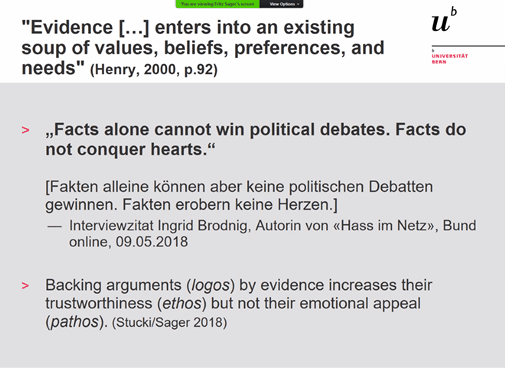My favorite quote so far from today’s Public Health Schweiz’s conference (#SPHC2020):
Facts alone cannot win political debates. Facts do not conquer hearts.
As Fritz Sager (#UNIBE) explained, too often scientists think the public will be swayed by facts.
He suggests that when working with policy administrators (i.e. bureaucrats*), researchers need to:
– explain what problem they’re trying to solve, focusing on what part of that problem they’re addressing (can’t solve COVID; can work on changing people’s behavior)
– identify people causing the problem as targets of the proposed policy
– identify policy proposals that may change the target group’s behavior so they no longer cause the problem.
– providence evidence of the intervention’s effectiveness
It reminds me of engineering: Engineers need to build the best bridge possible–in the time frame and within budget limits; thus it likely won’t be the perfect bridge, but it will be quite satisfactory. Policy proponents need to adopt the same attitude of finding solutions that will actually be adopted, even if they’re not the perfect or complete solution. The vote for 2 weeks of paternity leave (rather than 4) and the mostly-ban on smoking in SBB stations (rather than a complete ban) are good examples of advocates supporting a partial solution as a first step.
Advocates also tend to get bogged down with details–exactly how many people, divided by subcategory, experience a problem. Advocates are passionate about the cause and care about those details. But as explained in today’s presentation, researchers, data analysts and scientists need to understand their audience, including the reality that their audience does not think the way they do.
Two efforts in America to explain progressive, liberal concepts to conservative or uninterested audiences:
- The Indivisible Guide to approaching your politicians and governmental representatives
- Voicing our Values, that describes how to explain liberal ideas to conservatives in the US.
For example, conservatives might say spending to combat climate change is too expensive. Progressives can respond:
What costs too much is what we’re doing now. 1,300 counties [in the US] have been declared disaster areas due to drought, losing billions of dollars in crops, exports and income. This year’s wildfires have cost us billions more in firefighting and emergency aid. Clean energy is practical, affordable and inexhaustible—it’s the fastest growing energy sector around the world. America has the know-how to power our economy with clean energy—if we break Big Oil’s grip on Washington.
To promote needed programs, fair policies and new solutions, researchers and advocates need to learn how to present their ideas effectively and work with their audience.
*as a former state government employee, I think of “bureaucrat” as a good word — it represents people slogging through changes in administration and political winds to get the work done serving the public.

